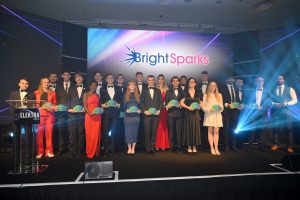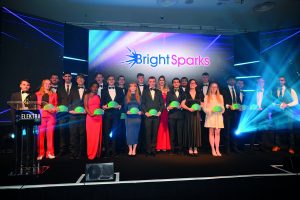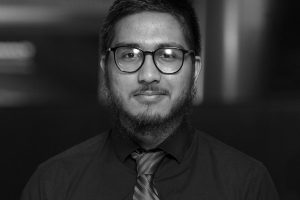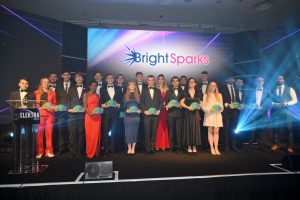Here, in our series on the latest EW BrightSparks of 2023, we profile Daniel Schmeer, an IC Test & Verification Engineer at Crypto Quantique.
Achievements
A colleague of Daniel’s at Crypto Quantique – an IoT security provider for both OEMs and semiconductor manufacturers – outlined the range of his achievements over the past couple of years.
For example, in terms of chip design skills, Daniel took on the IO pad ring on the company’s advanced technology implementations in 22nm (bulk CMOS and FDSOI) of QDID (Quantum-Driven Identity).
“The task involved researching the technology requirements from the foundry from an IO safety/ESD perspective and designing an optimal pad ring structure with appropriate protection mechanisms built in. Dan had to master Cadence’s design tools and Siemen’s simulation environment to ensure the design and verification of the circuit blocks. Working on the IO structures also required an understanding of the chip’s IO electrical (voltage,current, drive strength) requirements of the analog and digital sections of the chip.”
Also, as an example of his work on silicon characterisation and his testing skills, we were told that Daniel “owned the testing platform” for chipset validation and characterisation.
 He suggested improvements to the test methodology and ported a legacy Arduino-based test suite onto a cost effective python-based Raspberry Pi implementation. “Remarkable initiative taken by a fresh graduate demonstrating confidence and embedded programming skills in the first year of a new job. Dan made several contributions involving various complicated test setups for low-noise, pico-amp level accuracy temperature characterisation and full system QDID evaluation.”
He suggested improvements to the test methodology and ported a legacy Arduino-based test suite onto a cost effective python-based Raspberry Pi implementation. “Remarkable initiative taken by a fresh graduate demonstrating confidence and embedded programming skills in the first year of a new job. Dan made several contributions involving various complicated test setups for low-noise, pico-amp level accuracy temperature characterisation and full system QDID evaluation.”
In terms of PCB Design skills and again showing initiative, Dan was also tasked with PCB design and the layout of multiple test boards as a part of the company’s silicon validation efforts. This not only required skills in optimizing board level design and interconnections, we learned, but also required adaptability to account for the global semiconductor stock shortage in 2022.
Daniel devised smart alternatives for component shortages and was highly resourceful in identifying modifications to the test boards that would allow extension of CryptoQuantique’s testing to future architectures.
With regards to digital front-end expertise, Daniel was also involved with an external-facing role:
“He transitioned to acquiring knowledge of digital control and finite-state machines – initially on FPGA platforms and subsequently transferring onto ASIC implementations. Daniel learnt and adapted Verilog and SystemVerilog code for developing CQ’s digital front-end for a test chip.”
“Dan also helped in preparation and setup of the FPGA-based hardware demos of CQ’s quantum-based key generation scheme at Embedded World in March 2023. This required a knowledge of ARM’s Advanced Microcontroller Bus Architecture(AMBA) environment and designing the peripheral communications to allow key generation from CQ’s QDID. He was also keen to network with vendors, customers and competitors to highlight CQ’s unique offering as well as relay the information from the conference to the CQ team on possible improvements to future demo boards.”
Finally, to highlight his digital back-end skills, when the company was struggling to fill a digital back-end implementation role for its next-generation project, Daniel decided to extend his expertise.
Specifically, he extended his recently-acquired knowledge and experience in RTL design to also understand various digital back-end processes such as Synthesis, Place & Route, Static Timing Analysis checks etc. And also their implementation using Siemens, Cadence & Synopsys tools to generate a DRC, LVS clean digital IP. A prototype was successfully verified and fabricated on a Global Foundries advanced process node.
Community
In terms of community or STEM involvement, Daniel has volunteered to help with lab setups and simple FPGA projects for four school students on weekly work-experiences through the month of July and August.
All the students, we learned, appreciated Dan’s patience and efforts to help them bridge the gap between school level physics/maths/electronics and what was being deployed in the industry.
His nominator also summarised his work supporting an intern:
“The CryptoQuantique ethos is to tap into the smartest talent in the UK as well as try to contribute to the advancement of semiconductor careers among young students. The engineering team decided to offer a paid summer internship to a bright 2nd year EE student from Queen’s college Cambridge. Dan was assigned as the mentor to this student intern, and he did an amazing job of organising the student’s activities so the internship was beneficial to both CQ and the student.”
Also, outside work, Daniel adds:
“I have spent several years working and volunteering in the entertainment industry, first during my time at university and then in my spare time while working for CQ.”
“This has involved running productions for a number of a artists and events from small awards dinners to music festivals. Throughout this period, I have been able to mentor and teach new joiners and volunteers the different technical skills they need to pull off the show, which includes everything from how to build and design a system, learning how to logically debug a system and above all keeping everyone safe.”
He told us how he enjoyed seeing how individuals can rise to new challenges and solve complex debugging problems in an environment where – if everything works correctly – no one really notices you were there.
See also: Elektra Awards 2023 – The Winners
 Electronics Weekly Electronics Design & Components Tech News
Electronics Weekly Electronics Design & Components Tech News



